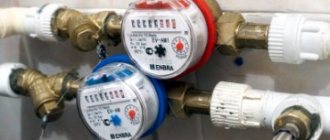Home / Real estate / Purchasing real estate / Buying an apartment
Back
Published: 12/05/2017
Reading time: 5 min
0
127
Utilities supplied to residential and non-residential premises must be paid by the owners of such premises or their tenants. However, there are times when payments are not received on time. Then debts arise. There are mechanisms for purchasing an apartment with debts, which, if followed, can minimize the risks of the purchase.
- Debt check
- Buying an apartment with debts
- Additional agreement
Do you need to pay other people's debts?
The secondary real estate market includes thousands of different apartments for every taste. In most cases, the housing is “clean” and the new owners will not have any problems. It is even more reliable to purchase apartments in new buildings. Statistics show that today about 70% of people who bought a home are satisfied. 25% of apartments are sold with small debts, which are repaid towards the cost of the apartment, and the remaining 5% are malicious defaulters who have huge debts. It is the last category of real estate that is the most problematic.
Please contact the seller directly. The point is that anyone can pay their bills if they have a job. Willful defaulters are people with alcohol or drug addiction, as well as persons with limited legal capacity. In any case, cooperation with such sellers should always be wary, and all necessary checks should be carried out.
Do I need to pay off debts for the previous owner?
A new home owner may be faced with the unpleasant fact that the buyer did not pay utility bills. The question arises: we bought an apartment with debts, who should pay.
You can defend your interests if you take several actions.
3 tips on how to avoid paying other people's debts
- Contact the previous owner to obtain a certificate of the amount of debts. If the previous owner does not provide such a document, you can contact the management company.
- Submit documents confirming the change of ownership to the homeowners association or management company.
- Try to resolve the issue with the previous owner of the property. Agree that he will pay off the debt himself.
It will not be possible to buy a home with debts if the property is seized by a court decision.
Checking for debts
You shouldn’t take the seller’s word that everything is fine with the apartment and there are no problems. Responsible sellers prepare a certificate in advance stating that all utility bills have been paid. This allows you to save time and get rid of unnecessary questions. As for the buyer, he must in any case check:
- are there acts on the removal of control indicators from devices that keep individual records of consumed resources (not required in all cases);
- whether payment for utilities has been made for the period when the purchase of housing is made.
If the seller provides a certificate, then it must have the stamps of the organization and the signature of the official who issued it.
If there is still a debt, it is necessary to find out the exact amount. The seller is obliged to provide full cooperation with this information. If he refuses to provide this data, then you can obtain it yourself. To do this, you need to submit a request to the management company or cooperative. The issued certificate will indicate the amount of non-payment for various types of utilities. If there are no debts, then this will be indicated in the documents. In this case, you can purchase housing without fear. At least she won’t have problems with utility debts.
The nuances of buying a home with housing and communal services debt
According to paragraph 1 of Art. 131 of the Civil Code of the Russian Federation and clause 5, part 2, art. 153 of the Housing Code of the Russian Federation, a person who has acquired real estate must pay off the debt for utilities. However, the purchase and sale agreement can stipulate that this responsibility is assigned to the previous owner, if the parties have agreed on this.
Debts may include the following expenses:
- Payment for premises. Its contents include:
- payment for current repairs of joint property;
- cost of management services for an apartment building;
- fee for waste disposal.
- Overhaul of the premises.
- Making payments for the use of housing and communal services (water supply, heating, electricity, gas supply).
According to Art. 210 of the Civil Code, the acquirer is not liable for the debt obligations of the previous owner of the apartment. Debts can be repaid partially, that is, the burden can be divided equally. Transfer of debt implies the transfer of this responsibility to the new owner, which is usually done by mutual agreement.
As Art. 210 of the Civil Code, the obligation to pay off debts is assigned to each owner, that is, both the previous and the present. But there is one exception - this is a major renovation in an apartment building. According to Part 3 of Art. 158 of the Housing Code of the Russian Federation, the new owner is obliged to repay the debt, if any, regarding the contributions of the previous one.
Have a question or need legal help? Take advantage of a free consultation:
As for other debts, the point should be indicated in the transfer and acceptance certificate that the obligations to repay utility debts lie with the previous owner of the apartment. This act should also record all current meter readings, which guarantees payment for consumed services until the transfer of the right to the object occurs according to law. After this, the management company will be responsible for renewing contracts with energy suppliers.
In the interval between submitting documents to Rosreestr and registering the right, but strictly before the transfer of the object, the buyer needs to come to the management company in order to register his own personal account. Thus, the old debts of the previous owner will be registered with him.
When dealing with real estate, it is difficult to foresee everything. It happens that the buyer of the apartment relied on the good faith of the seller and did not check whether all debts were paid. Or the notice came after the purchase, and the new owner does not know how the debt arose in the first place. The new owner begins to pay utility bills from the moment the title to the premises is transferred.
Step 1. You should ask the previous owner for a certificate of debt. However, you cannot rely on honesty alone. You can obtain this document in other ways:
- contact the Criminal Code and request a certificate of debts or lack thereof for the entire period preceding the transaction;
- check: how long has the management company, residential complex or HOA been servicing the house, and if previously, judging by the documents and receipts, the house was serviced by another company, contact them.
Step 2. Compose an application with an attachment about the applicant’s utility payments. A title document is attached to this document.
As practice shows, the new owner has priority in resolving controversial issues, because he is not obliged to pay debts for the previous owner. But if an agreement has been reached, then the new owner will deal with the debt. This may be justified if there is a significant discount on the price of the apartment.
We suggest you read: What happens if I turn around through a regular solid line
There are profitable offers on the market for objects acquired through privatization. However, such apartments have special requirements regarding debts:
- transparency of the transaction, that is, notification of all parties about the debt;
- signing an agreement that debts will be repaid, for example, from the amount of the advance payment (if the owner does not have available funds);
- an indication of the presence of debt in the contract with an appendix confirming that the debt is registered with the seller.
These measures are more helpful in avoiding problems for the former owner than for the buyer, because he is the one who, by law, must pay off the debts.
The Civil Code clearly states how real estate with debt should be registered. The rules are as follows:
- both the acquirer and the seller must participate equally in the process;
- for real estate it is required to collect the entire package of documentation that clarifies the situation with debts;
- the agreement should be drawn up carefully, in strict accordance with the law and on all points relating to the payment of debts.
The apartment owner prepares the following package: passport, title document, technical passport of the property, extract from Rosreestr.
In case of privatization, the seller is obliged to additionally provide:
- document on the status of the personal account;
- registration information;
- certificate from the Unified State Register;
- marriage certificate;
- child's birth certificate;
- technical plan of the facility;
- income document.
These documents serve as confirmation that the owner of the apartment is able to pay the debt. However, this can be done after purchasing a home.
Attention! Due to recent changes in legislation, the information in this article may be out of date. However, each situation is individual.
To resolve your issue, fill out the following form or call the numbers listed on the website, and our lawyers will advise you for free!
It does not always happen that a transaction related to the purchase of real estate goes like clockwork. For example, real estate may be full of debts left over from the previous owner, and it is quite difficult to privatize such housing, since utility services do not want to provide the necessary certificates. But the new owner often does not even understand how the debt arose, or knew about it, but hoped that the seller was conscientious and paid his debts.
If this has not been done, then many problems arise, the solution of which not only takes a lot of time, but also takes a lot of nerves. Nevertheless, it is necessary to prove your truth, because the new owner of the property must pay for utilities starting from the moment the rights to housing have passed into his hands.
Don't be afraid to assert your legal rights. To do this, the buyer must take the following steps:
- You must obtain a certificate from the previous owner regarding the status of the debt. If this fact was hidden during the sale of the home, you cannot be completely sure that the person will hand over this document. If this happens, you can get a certificate in another way:
- Independently contact the Criminal Code with a request to submit a document on the status of the debt for the period until you took possession;
- If the management company, HOA or residential complex managed the house not so long ago, that is, they began servicing later than the moment when the rights to the property were transferred to the new owner, then you need to contact the organization that serviced the house before. It’s easy to find a responsible company; just look at the documents for the apartment.
- Having dealt with the first point, you can safely move on to the second. It consists of writing an application and attaching to it a document on the applicant’s utility payments. It is also advisable to provide a copy of the purchase/sale agreement, which indicates exactly when the property was purchased. And also, it wouldn’t hurt to add a certificate of ownership to the list of documents.
As a rule, such issues are resolved in favor of the buyer who has been charged with someone else's debts. He may not worry about them, unless, of course, a document was signed in advance on the transfer of debts from one person (the seller) to another (the buyer). In this case, as already mentioned, the issue of debt is resolved by the new owner.
It is advisable to warn the old owner that claims have been made against him for the payment of debts. As a rule, if a person is conscientious, then you won’t have to do anything else, and he will deal with all the issues. Utilities can demand repayment of the debt for three years. This is precisely where the conflict of interest lies - one party wants to receive the funds due to it, and the second does not want to pay for services that it did not use. In general, resolving this dispute is not a pleasant procedure.
There are a lot of offers on the secondary market at a favorable price, which suggest that something is not clean in this transaction. As a rule, it's a matter of utility debts. Of course, in such cases, when a privatized apartment with utility debts is sold, certain requirements must be met. In particular, they relate to the following nuances:
- All parties must be aware of the existence of a debt before signing the purchase/sale agreement;
- The parties can enter into a written agreement, which states that the utilities will be paid from the amount of the advance that the seller received if he is unable to pay the debt with his own funds;
- Reflect the moment of existence of the debt in the contract, for example, by attaching to it a document confirming that the debt remains with the seller and it is he who is responsible for paying it.
These simple manipulations will allow you to avoid many problems with the law for the former owner, and not the person trying to buy an apartment, because it is he who is directly affected by liability for outdated debts.
As for how the transaction itself is carried out, there are several rules for this that are regulated by the Civil Code of the Russian Federation. For example, here is what is said about the components of such a transaction:
- Both parties, both buyer and seller, must participate in the process;
- All real estate documents must be collected that reveal the complete picture regarding the situation;
- Having a correctly drawn up contract is also a prerequisite when working with a transaction. That is why, in order to sell an apartment with debts for housing and communal services, it is important to hire a good specialist who will draw up all the clauses of the contract and highlight the necessary nuances where you should pay attention so that the purchased property does not become a stumbling block between the actual and former owners.
We invite you to familiarize yourself with: Tax on the sale of an apartment - calculator
Features of purchasing an apartment
So, taking into account the above, it can be noted that buying an apartment with utility debts has its own characteristics, although in general the procedure is standard. The following steps are provided for this:
- check the documents for the apartment;
- check for arrests or other types of encumbrances;
- check the certificate of absence of debts for utilities;
- if there are debts, it is necessary to resolve the issue of their repayment (this is done either by the seller or the buyer on account of the cost of the housing, which must be indicated in the contract);
- write an application to Rosreestr regarding registration of property rights;
- draw up an agreement and transfer funds in any convenient way.
Note that if the debt for utilities is repaid by the buyer, then the exact amount must be indicated in the contract. This is extremely important, because it will reduce the price of the apartment itself.
[smartcontrol_youtube_shortcode key=”Buying an apartment with debts on utility bills” cnt=”1" col=”1" shls=”true”]
What documents are required to purchase an apartment with utility debts? The list is standard and includes the following papers:
- identification of all participants in the transaction;
- extract from Rosreestr;
- an extract from the tax service confirming the absence of debt;
- certificate-invoice from the management company or other organization;
- an extract from the house register, which contains information about all the people registered in the apartment;
- contract of sale;
- agreement on the repayment of utility debts by the seller or buyer;
- documents confirming ownership of the apartment;
- receipt for payment of state duty;
- act of acceptance and transfer of apartment and funds.
Depending on the specific situation, additional documents may be required. For example, if payment occurs through a cell.
What to do if you bought an apartment with debts on utility bills?
If a situation occurs where residential real estate was purchased with utility debts, then you can defend your legal rights and still not repay these debts in the future by following these steps:
- Request a certificate from the previous owner of the apartment about the status of the debt , and in the absence of one, you should independently contact the management company, HOA or residential complex to obtain the necessary information. If the listed organizations began managing the house later than the date of registration of the seller’s ownership, then in this case a certificate of debt status will be provided by the previous responsible company;
- Notify the management company, HOA or residential complex about the change of owner of the apartment by writing a statement and attaching to it a copy of the purchase and sale agreement and a certificate of registration of ownership;
- Notify the previous owner of residential property about received demands to repay the debt for utility services for the period when he was the current owner of the apartment. Perhaps the previous owner will voluntarily fulfill his obligations.










